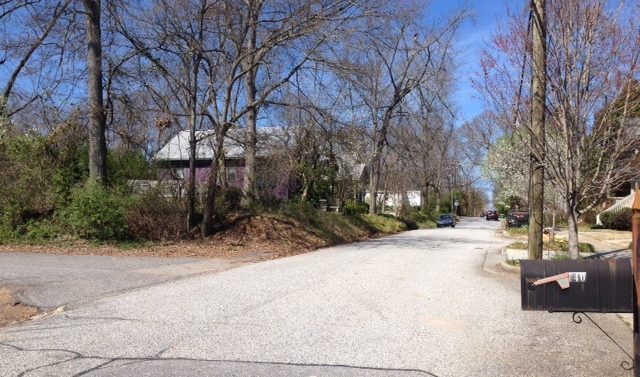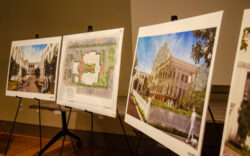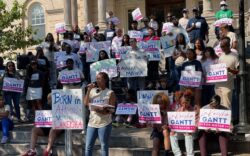Like many Normaltown residents, Jennifer Rice moved into the neighborhood so she and her family could walk and bike to school, restaurants and other businesses. She and other Yonah Avenue residents are worried that a proposed medical office and parking deck in the commercial heart of Normaltown will make that a lot more dangerous.
Plans for the approximately 40,000 square-foot building include a 142-space parking deck. Cars will enter the deck from Prince. But for safety reasons related to restricted visibility due to the on-street parking along Prince Avenue and mid-block location between two traffic lights, cars—up to 800 of them daily, according to a traffic study conducted by the engineering firm Armentrout, Matheny, Thurmond on behalf of the developer—will leave via Yonah behind the development, then proceed to either Satula or Park and back onto Prince. Yonah currently handles about 400 cars per day.
“Our immediate and biggest concern is the significant increase in traffic on a very small residential street,” Rice said, noting that many families in the area have dogs and small children, and a daycare is nearby.
Everyone was aware, or should have been aware, that the former location of the legendary Allen’s wouldn’t stay vacant forever after the bar and restaurant shuttered about 10 years ago, and the building was torn down. When she moved to Yonah in 2011, though, Rice, understandably, assumed that any development would be similar in scale to the surrounding buildings and not include a parking deck.
In early 2012, the ACC Commission was on the verge of accepting a Prince Avenue study that included a recommendation limiting medical offices to 10,000 square feet—the same size as other types of offices along the corridor. Developers quickly filed plans for the medical office described above in order to get in before any zoning changes the commission might approve. As it turns out, they needn’t have bothered; the corridor study has languished for almost three years. Earlier this month, commissioners finally mustered themselves to force Mayor Nancy Denson to call a joint commission-planning commission work session to start up discussions again.
That doesn’t do Rice or her neighbors much good. “From a planning and zoning standpoint, there’s really nothing to prohibit this development from moving forward as is,” ACC Senior Planner Bruce Lonnee said. A few details are left to be worked out, but Lonnee said ACC officials are close to approving the plans; he didn’t know when the developer will pull a permit and start construction.
It’s possible the additional traffic could be mitigated. If the volume and speed of cars reach certain thresholds, neighbors could request traffic-calming measures like speed humps or radar signs. The development will include a sidewalk, and residents could also petition for ACC to extend those sidewalks along the entire street, where there are none now. It could be done, Lonnee said, but it would be challenging, given that houses are very close to their property lines, and some lack any off-street parking, putting space at a premium.
Meanwhile, Rice and her neighbors are considering their options, including some type of “Save Yonah” campaign and possibly legal action. Any parking deck that doesn’t include both ingress and egress to and from Prince is unacceptable, she said, and she’d like the county to study the traffic impact on Park, Satula and Prince as well as Yonah.
This kind of conflict isn’t new, and it’s difficult to avoid if Athens is going to grow up rather than out. “It’s one of those challenges as a community reinvests and reinvents,” Lonnee said. The Mayor and Commission have the tools to deal with them, but only now are they getting off the sidelines.
This article originally misstated who conducted the development’s traffic study.
Like what you just read? Support Flagpole by making a donation today. Every dollar you give helps fund our ongoing mission to provide Athens with quality, independent journalism.










